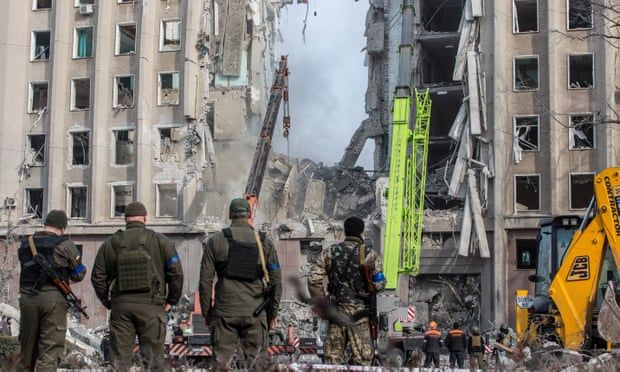
World Bank and IMF gathering underscores a bleak global outlook | Larry Elliot
In Washington it was the week of the four Ws – war, walkouts, weakness and warnings. Some half-yearly get-togethers of the International Monetary Fund and the World Bank are dull, easily forgettable affairs; this was not one of them.
The first W – the war in Ukraine – dominated the meetings and could well dominate the next gathering of the two institutions in the autumn as well. Despite pleas for the fighting to stop, there is no sign of that happening.
This will have dire consequences for Ukraine, Europe’s poorest country even before the Russian invasion. The World Bank estimates the cost in ruined buildings and infrastructure alone runs to $60bn (£46.7bn). The IMF says the economy could contract by almost 40% this year and that Kyiv will need external support of $5bn a month simply to keep the country operating.
Russia will also suffer severe damage as a result of its aggression, but the impact of the war is not confined to the two protagonists. It is leading to dearer energy and food, while the resulting higher inflation and slower global growth mean there is both a humanitarian and an economic rationale for bringing the war to an end.
Hence the second W: the symbolic walkout by the British, Americans and Canadians when the Russian representatives started to speak at the meeting of G20 finance ministers and central bank governors. Russia retaliated by blocking the release of a communique at the end of the meeting of the IMF’s main policy committee, which traditionally requires unanimity.
These diplomatic manoeuvres highlighted weaknesses in the multilateral system – the third W. The G20 came to prominence during the global financial crisis and was supposed to supersede the G7 as the prime international forum for economic policymakers.
This made sense. The G7 represented only the bigger developed countries while the G20 included a broader group of strategically important nations such as China, India, Brazil, Saudi Arabia – and Russia.
The G20 made a good start at the London summit of 2009 but has subsequently failed on its promise. It has become a talking shop where countries discuss the pressing problems of the day – the need to make vaccines widely available or the lack of an effective mechanism for delivering debt relief – but then fail to come up with the required solutions. There is plenty of grandstanding but little common purpose, as was demonstrated last week. By no means all G20 members are willing publicly to express displeasure at what Russia is doing in Ukraine.
This brings us to the fourth and final W: the air in Washington last week was thick with warnings. The IMF warned that recovery from the pandemic would be a lot slower than expected and that central banks would find it harder to calibrate the right level for interest rates. The World Bank warned that people would go hungry as a result of higher food prices, perhaps resulting in social unrest. Both the IMF and the World Bank warned of rising debt distress.
The outlook is poor for developed countries such as Britain, where cost of living pressures are already starting to weigh on confidence and spending. The prospects are, though, even worse for poorer parts of the world at a time when some central banks – including the US Federal Reserve – are becoming increasingly hawkish.
Krishna Guha, an analyst at the investment bank Evercore, says: “The larger takeaway from the IMF and World Bank meetings … is the acute vulnerability of non-commodity exporting emerging market countries to a perfect storm of an unfinished pandemic recovery with high debt, the war shock to energy and food prices, China lockdown growth risk, and Fed tightening.”
That is a reasonable summary and echoes warnings from the UN that weaker global demand, insufficient policy coordination at the international level and rising debt levels from the pandemic will generate financial shockwaves that will push some developing countries into a downward spiral of insolvency, recession and arrested development.
Achim Steiner, an administrator of the UN Development Programme, says he is “extremely concerned” at the scale of the crisis and the speed at which it is unfolding. “We are ill-prepared to deal with this. As a result of the pandemic, many poor countries have no fiscal space left and have their backs to the wall”. Almost 70 countries, he adds, are facing the “perfect storm” of rising energy costs, rising food prices and heavier debt-servicing costs.
A fifth W was notable by its absence in Washington last week, and that’s winning. The IMF took some comfort from the $40bn of pledges made to its Resilience and Sustainability Trust – designed to help poor countries tackle the climate crisis and other structural challenges – but Ukraine alone is going to need more than that.
Every finance minister and central bank governor knows that the war is a catastrophe for the global economy and the costs will mount the longer it goes on. It’s easy to see what defeat looks like: stagflation and falling living standards in the developed parts of the world; hunger, food riots and debt defaults in the poorer parts.
It is harder to see what victory looks like, other than a pyrrhic one. An immediate ceasefire and Russian withdrawal would lead to lower energy and food prices, reduce inflation and make it easier for central banks to limit the extent of interest rate rises. A prolonged war of attrition is a more likely scenario, and that will lead eventually to weaker demand, a collapse in energy prices and much lower inflation rates.
For now though, the best that the IMF and the World Bank can offer is damage limitation. The outlook is grim and getting grimmer.











